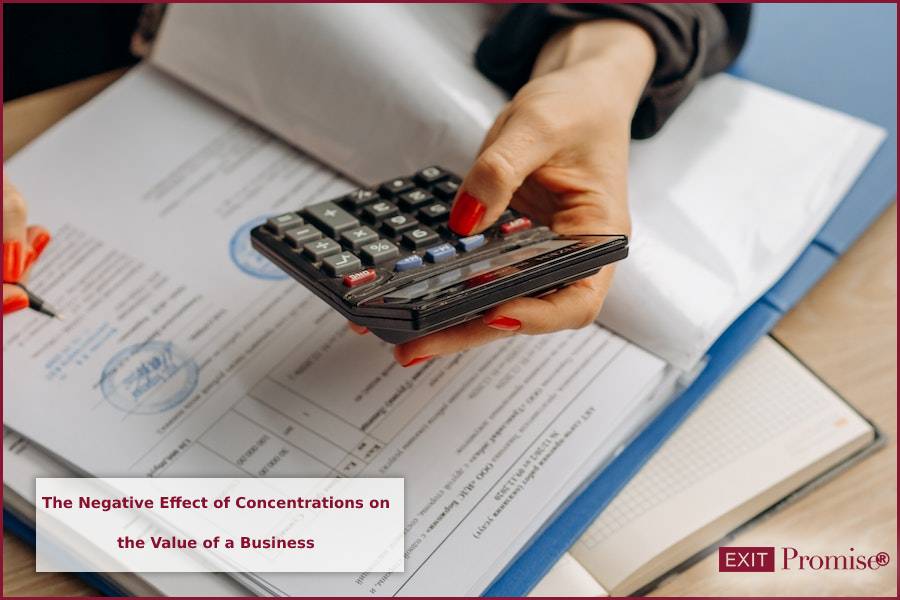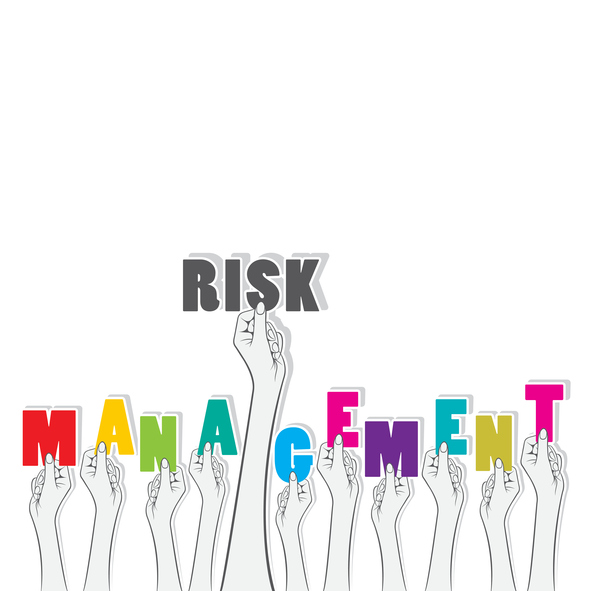
by Eric M. Magister, M.A. in Law | Business Valuation |
A common method used to calculate business value involves applying a multiple to the company’s EBITDA. And while business owners who intend to sell their business have many options to increase the transaction multiple, one way to unlock value using this calculation is to identify other, non-customary “add-backs” to increase EBITDA.
![The Three Business Valuation Approaches [Infographic]](https://exitpromise.com/wp-content/uploads/2022/10/three-approaches-to-business-valuations.jpg)
by Eric M. Magister, M.A. in Law | Business Valuation |
At some point during a company’s existence, it’s very likely a business owner will need a business valuation. Regardless of the reason, it is very important to understand how business valuations are conducted.

by Eric M. Magister, M.A. in Law | Business Valuation |
When all other factors are equal, the presence of a significant concentration among customers, suppliers, and/or employees results in a lower business value than might otherwise be expected due to the underlying inherent risks associated with any or all of these concentrations.

by Holly Magister, CPA | Business Valuation |
Many business owners are uncertain about how to establish a value for their business, regardless of its stage of development. How to value ideas, start-ups and mature businesses differ greatly. Learn more.

by Neal Isaacs, MBA, CBI, CM&AP | Business Valuation |
Business owners who address the three hallmarks of a valuable business are very likely to have more options for exit and attract multiple buyers.

by Neal Isaacs, MBA, CBI, CM&AP | Business Valuation |
As a business intermediary helping owners determine the “Most Probable Sales Price,” or MPSP of their businesses here in the Triangle, I hear a common question:
“That value makes sense, but what about all my stuff? Can I get paid for that too?”
The answer is rarely what the business owner wants to hear, but there’s a sound reason for it, and understanding how businesses are priced can help an owner with decisions on how to allocate resources for assets; especially if they are planning to sell in the near future.
In this article, we’ll explore the market approach for small businesses and what value the assets carry…

by Eric M. Magister, M.A. in Law | Business Valuation |
Quite simply, a business valuation is a process and set of procedures used to determine what a business worth. Sounds unambiguous, right? But it takes more than just plugging numbers into a formula — a credible business valuation requires knowledge, preparation, and a thorough understanding of the business. The result is an objective assessment of the real value of the business. In addition to estimating the selling price of a business, a business valuation can be used for many legal purposes such as divorce litigation, shareholder disputes, and estate or gift taxation.

by Eric M. Magister, M.A. in Law | Business Valuation |
Depending on the circumstances and objective of the owner, the value of a business can vary considerably. For instance, upon sale to unrelated party, an owner would expect to receive the maximum purchase price for their business the unrelated party is willing to pay. However, that same sale to a family member or employee may need to be structured so the cash flow of the business can support the purchase price.
For a closely held business, owners generally have little idea about the value of their business, or whether their business is generating an adequate return on investment, and what drives its value.
by Neal Isaacs, MBA, CBI, CM&AP | Business Valuation |
A Broker’s Opinion of Value, or BOV, can help an owner determine what the business would sell for on the open market. This, in relation to an owner’s “pain” level, are often enough to make a decision if they are ready to sell.

by Holly Magister, CPA | Business Valuation |
v Have a Question? Add it to the bottom of this post! For many entrepreneurs, launching a new business often means walking a fine line between pursuing earnings growth and growing the top-line revenue. A business can’t be successful in the long-term without earning a...

by Holly Magister, CPA | Business Valuation |
EBITDA Margin and Adjusted EBITDA Margin are similar measurements used by business owners and others who value businesses for sale. Let’s break down the two terms to help your understand which measurement of profit and cash flow are most relevant for your...

by Holly Magister, CPA | Business Valuation |
How could there be risks in your business relationships? For most business owners who’ve started a business from scratch, the notion of regarding as risky the many positive relationships they’ve built over the years with customers, vendors, and even employees is...

by Holly Magister, CPA | Business Valuation |
Book Value is defined as the total value of a company if it were to liquidate its assets and pay back its liabilities, or the value of the company according to the financial statement. Book value (BV) is also sometimes referred to as “shareholder’s equity.” Business...

by Holly Magister, CPA | Business Valuation |
v Have a Question? Add it to the bottom of this post! Net equity value is the fair market value of a business’s assets minus its liabilities. This measured value is used to determine a business’s net worth – or the funds that would be left over and available to...

by Holly Magister, CPA | Business Valuation |
The discount rate can be defined in several ways. For purposes of this post, the discount rate will be defined as it relates to small and medium sized businesses (SMBs) and the Discounted Cash Flow (DCF) valuation method. As it applies to a business investment...

by Holly Magister, CPA | Business Valuation |
Have a Question? Ask your question below and one of our Advisors will answer. The Discount for Lack of Marketability, or DLOM, is a discount applied to a company’s value when an ownership interest cannot be converted to cash quickly, and free of excessive expenses....

by Holly Magister, CPA | Business Valuation |
The term business value is a broad term that refers to any form of business valuation which determines the financial health and potential of a company. While a purchase or selling price is simply an amount that may be asked to be paid for a 100% ownership of a given...

by Holly Magister, CPA | Business Valuation |
Capitalization Rate, more commonly referred to as Cap Rate, is the rate of return on a real estate investment based on the income the property is expected to generate. In other words, the Capitalization Rate is used to estimate an investor’s likely return on...

by Holly Magister, CPA | Business Valuation |
EBITDA Valuation is an industry multiple or ratio method that is used commonly to determine the Enterprise Value of a company operating in the lower-middle or middle market. It differs from the method typically used by small businesses (also referred to as Main...

by Holly Magister, CPA | Business Valuation |
Seller’s Discretionary Cash Flow (SDCF), also sometimes referred to as seller’s discretionary income (SDI) or seller’s discretionary earnings (SDE), is a computation often used when valuing a small or medium-sized business. While larger, public companies are often...

![The Three Business Valuation Approaches [Infographic]](https://exitpromise.com/wp-content/uploads/2022/10/three-approaches-to-business-valuations.jpg)




























